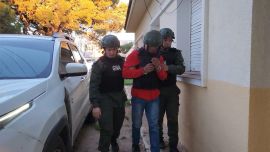The morning after Venezuela’s streets erupted against Nicolás Maduro’s self-declared victory, his defence minister appeared on the airwaves to make clear how the armed forces viewed protests over an allegedly stolen vote.
“It’s something truly absurd, it’s something completely improbable,” scoffed Vladimir Padrino López, who has commanded the nation’s military for nearly a decade. The unrest “is a contradiction fomented by the extreme right.”
Regional powers from the US to Colombia and Brazil have cast doubt on Maduro’s victory, while opposition leader María Corina Machado says she has proof her stand-in candidate defeated the authoritarian incumbent by a wide margin in Sunday’s vote. But analysts say all that may not matter much as long as the armed forces, long the nation’s key arbitrator of power, are unwilling to break ranks.
“There’s relative clarity that the only way that there can actually be a transition is one in which you negotiate with the military,” said Andrei Serbin Pont, president of the Buenos Aires-based research group CRIES, who closely monitors Venezuela’s security forces.
Tuesday’s remarks by Padrino López, who addressed the nation flanked by members of the military high command, appeared to be “closing the door on negotiations,” Serbin Pont added.
During Maduro’s 11 years in power, Venezuela’s security forces have largely stood by his side. They put down nationwide protests that erupted in 2014 and 2017 after past electoral abuses. In 2019, US-backed opposition leader Juan Guaidó claimed he had enough military support to unseat Maduro, only to see it all unravel days later.
In exchange for their loyalty, Maduro has rewarded the Armed Forces with the lucrative control of ports, oil concessions and mining projects. He has also packed his cabinet with decorated officers and tried to increase the ranks of the military.
That practice came to define Venezuelan politics during the term of the late Hugo Chávez, Maduro’s predecessor and mentor. The former army colonel, who took power 25 years ago, called for “civil-military union” and put soldiers in posts long-held by civilians.
Estimates on the military’s current size vary widely, ranging from around 100,000 soldiers to as much 400,000 when including members of the militia. But it’s been plagued by desertions in recent years as the oil-rich nation’s economy went belly up under Maduro’s watch.
This is a modal window.The media could not be loaded, either because the server or network failed or because the format is not supported.
“Especially among lower ranking officers and troops, living conditions are difficult — as they are for their family members,” Harold Trinkunas, a senior scholar at Stanford University in California, said by email. “If Maduro has to call on the army, navy, and air force to intervene, he does so at the risk of provoking a split in the military.”
Low morale led to sporadic challenges against to the regime. Military dissidents were plotting against Maduro ahead of his election to a second term in May 2018, and three months after that vote he was left unharmed in a failed drone assassination attempt.
The government has clamped down on dissent inside barracks and outside Venezuela’s borders ever since.
Chile is demanding that the regime in Caracas help investigate the March kidnapping and death of a former Venezuelan lieutenant who had fled to Santiago after participating in a foiled plot to topple Maduro. Some 25 students at Venezuela’s national police academy, meanwhile, went missing Sunday after protesting against being obligated to vote for Maduro, according to human rights groups.
Such actions are likely to deter rank-and-file members from disobeying orders to quash the protests that have erupted since Edmundo González, the candidate supported by Machado, challenged the results of the Sunday vote. The government announced 749 arrests on Tuesday in response to the protests while opposition leaders denounced the detention of a prominent González ally, Freddy Superlano, by security forces.
Trinkunas argues that Venezuela’s military is deliberately structured to safeguard against any potential challenge to Maduro. Lower ranking “troops are indoctrinated to favor the government, and they are constantly surveilled by the security services to identify and imprison anyone whose loyalty may be wavering,” he said.
He and other political observers say the fear of sanctions or trials for alleged human rights crimes may be preventing generals from breaking with the ruling socialists. Ahead of the July 28 vote, Machado seemed to dangle the possibility of amnesty if they guaranteed a political transition.
“Don’t fail us,” she said in a video message directed at the military. “We won’t fail you.”
So far, that offer seems to have been disregarded. Padrino López and top brass appeared alongside Maduro as he denounced the unrest as an attempt by opponents at home and abroad to destabilize the nation.
“We’ve seen this movie before,” Maduro said in a televised address Tuesday. “It has a beautiful and happy ending for you, compatriots.”
– TIMES/BLOOMBERG



















Comments